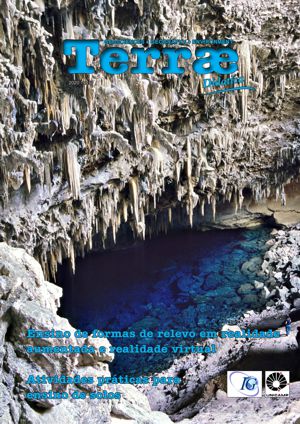Abstract
Payment for Environmental Services (PSA) is a policy implemented starting with the Brazilian 2012 Forest Code, as an incentive to maintain vegetation and/or restore permanent protection areas (APPs) in rural areas. The Water Producer Program is a partnership between actors in federal, state and municipal public management, non-governmental entities and rural producers, in water protection in the country. It seeks to achieve conservation of soil and water, and reduction of erosion and silting of water sources in rural areas, through sustainable practices and management. The assessment of the geoscientific knowledge of the actors involved employed a qualitative methodological framework, in a case study of the Water Producer Program of Salesópolis, São Paulo. Semi-structured interviews and a socio-environmental mapping workshop indicated the little (if any) notion regarding good practices in land use, recovery of degraded areas, soil preservation and other topics associated with geoscientific knowledge.
References
Agência Nacional de Águas (ANA). (2019). Website do Programa Produtor de Água. Brasília, DF. Disponível em: http://produtordeagua.ana.gov.br. Acesso em: 20.11.2019.
Bacci, D. D. L. C., Jacobi, P. R. & Santos, V. M. N. (2013). Aprendizagem Social nas Práticas Colaborativas; exemplos de ferramentas participativas envolvendo diferentes atores sociais. Revista de Educação em Ciência e Tecnologia, 6(3), 227-243. ISSN 1982-5153. Disponível em: https://periodicos.ufsc.br/index.php/alexandria/article/view/38160/29101. Acesso em: 02.09.2019.
Beck, U. (1994). The Reinvention of Politics: Towards a Theory of Reflexive Modernization. In: Beck, U., Giddens, A., & Lash, S. eds. (1994). Reflexive Modernization. Politics, Tradition and Aesthetics in the Modern Social Order. p. 1-55. Polity Press, Cambridge. ISBN: 9780804724722.
Conservador da Mantiqueira. (2020). Programa Conservador da Mantiqueira. Extrema, MG, Prefeitura Municipal de Extrema. Disponível em: https://conservadordamantiqueira.org/plano/. Acesso em: 20.03.2020.
Daily, G.C. (1997). Introduction: What are ecosystem services? In: Daily, G. C. ed. (1997). Nature’s Services: Societal Dependence on Natural Ecosystems. Washington, DC, Island Press. p. 1-10.
Diamond, J. (2005). Collapse. How Societies Choose to Fail or Survive. London: Allen Lane. 590p.
Favretto, D. (2012). Análise do sistema de pagamento por serviços ambientais no âmbito internacional. Anais do Universitas e Direito, PUC-PR. p. 134-151.
Gerhardt, T. E., & Silveira, D. T. (Orgs.). (2009). Métodos de pesquisa. Universidade Aberta do Brasil (UAB/UFRGS) e Curso de graduação tecnológica, planejamento e gestão para o desenvolvimento rural da SEAD/UFRGS. Porto Alegre: Ed. UFRGS. 120p.
Gjorup, A.F., Fidalgo, E. C. C., Prado, R. B., & Schuler, A. E. (2016). Análise de procedimentos de seleção de áreas prioritárias em programas de pagamentos por serviços ambientais hídricos. Taubaté, Revista Ambiente & Água [on line], 1, 225-238. doi: 10.4136/ambi-agua.1782.
Millenium Ecossystem Assessment (MEA). (2003). Ecosystems and human well-being: a framework for assessment. Washington, DC, Island Press. Disponível em: http://www.millenniumassessment.org/en/Framework.html. Acesso em: 27.09.2019.
Prado, R. B., Fidalgo, E. C. C., Ferreira, J. N., Campanha, M. M., Vargas, L. M. P., Mattos, L. M. de, Pedreira, B. C. C. G., Monteiro, J. M. G., ..., & Coutinho, H. L. C. (2015). Pesquisas em serviços ecossistêmicos e ambientais na paisagem rural do Brasil. Revista Brasileira de Geografia Física, 8(n. esp.), 610-622. (IV SMUD). doi: 10.26848/rbgf.v8.0.p610-622.
Prefeitura de Salesópolis. (2013). Plano Municipal de Saneamento da Estância Turística de Salesópolis. Salesópolis, SP.
Santos, V. M. N., & Jacobi, P. R. (2017). Educação, ambiente e aprendizagem social: metodologias participativas para geoconservação e sustentabilidade. Brasília, DF, Revista Brasileira de Estudos Pedagógicos, 98(249), 522-539. doi: 10.24109/2176-6681.rbep.98i249.2758.
Shiki, S.; Shiki S.F.N (2011). Os desafios de uma Política Nacional de Pagamentos por Serviços Ambientais: lições a partir do caso do Proambiente. Sustentabilidade em Debate, 2(1), 99-118. doi: 10.18472/SustDeb.v2n1.2011.3909.
Sparovek, G., Barretto, A., Klug, I., Papp, L., Lino, J. (2019). A revisão do Código Florestal brasileiro. Novos Estudos CEBRAP, 89, 111-135.
Stake, R. E. (2011). Pesquisa qualitativa: estudando como as coisas funcionam. Trad. Karla Reis; Rev. Técn. Nilda Jacks. Porto Alegre: Penso Ed. 263p.
Steiner, A. (2011). O uso de estudos de caso em pesquisas sobre política ambiental: vantagens e limitações. Curitiba, Revista de Sociologia Política, 19(38), 141-158. doi: 10.1590/S0104-44782011000100009.
Vandenabeele, J., & Goorden, L. (2009). Participatory planning in protected areas: exploring the social-science contribution. In: Arjen E.J. Wals ed. Social learning towards a sustainable world: Principles, perspectives, and praxis. p. 197-208.
Wildemeersch, D. (2009). Social learning revisited: Lessons learned from North and South. In: Arjen E. J. Wals ed. (2009 2nd ed.) Social Learning towards a sustainable world. Principles, perspectives and praxis. Cap. 4. p. 99-116. The Netherlands: Wageningen Academic Publishers. ISBN: 978-90-8686-031-9. doi: 10.3920/978-90-8686-594-9.

This work is licensed under a Creative Commons Attribution-NonCommercial 4.0 International License.
Copyright (c) 2020 Terrae Didatica


